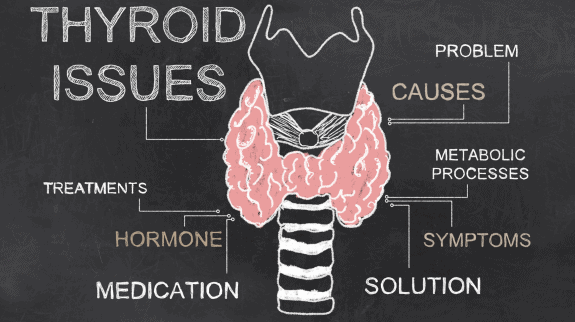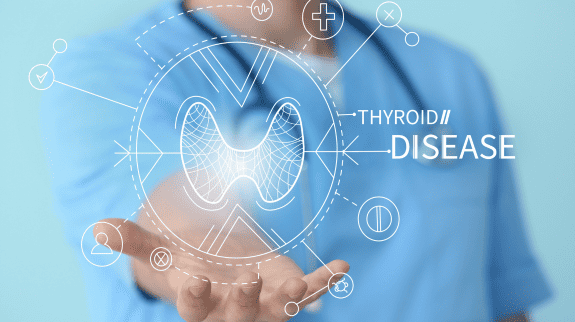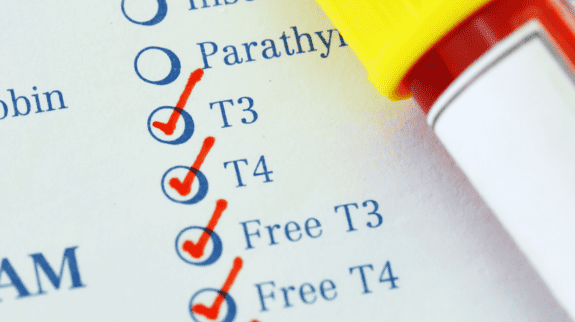An underactive thyroid, also known as hypothyroidism, occurs when the thyroid gland does not produce enough hormones. This condition affects millions of people worldwide, with women being more likely to develop it than men. Hypothyroidism can cause a range of symptoms, from fatigue and weight gain to depression and hair loss.
Recognizing the symptoms of an underactive thyroid is the first step in getting an accurate diagnosis and treatment. Some common signs of hypothyroidism include feeling tired all the time, gaining weight despite eating a healthy diet, feeling cold all the time, and experiencing constipation. However, these symptoms can also be caused by other conditions, so it’s important to see a healthcare provider for a proper diagnosis.
KEY TAKEAWAYS
- Recognizing the symptoms of an underactive thyroid is crucial for getting an accurate diagnosis and treatment.
- Hypothyroidism is more common in women than men and can cause a range of symptoms, including fatigue, weight gain, and depression.
- Seeing a healthcare provider for a proper diagnosis is important, as the symptoms of hypothyroidism can also be caused by other conditions.
How to Know If Your Thyroid Is Underactive

Hypothyroidism, also known as an underactive thyroid, is a condition where the thyroid gland does not produce enough thyroid hormones. The thyroid gland is a butterfly-shaped gland located in the neck that produces hormones that regulate metabolism. These hormones affect almost every cell in the body and are crucial for the body’s normal functioning.
The most common cause of hypothyroidism is an autoimmune condition called Hashimoto’s thyroiditis, where the body’s immune system attacks the thyroid gland.
Symptoms of hypothyroidism can be subtle and develop slowly over time. Some common symptoms include fatigue, weight gain, constipation, dry skin, and hair loss. In severe cases, hypothyroidism can lead to depression, memory problems, and even coma.
Diagnosis of hypothyroidism is done through a blood test that measures the levels of thyroid hormones and thyroid-stimulating hormone (TSH) in the blood. TSH is a hormone produced by the pituitary gland that stimulates the thyroid gland to produce thyroid hormones. If the TSH levels are high and the thyroid hormone levels are low, it indicates an underactive thyroid.
Treatment for hypothyroidism involves taking synthetic thyroid hormone medication, usually in the form of levothyroxine. The dosage of medication is adjusted based on the individual’s thyroid hormone levels and symptoms.
Recognizing Symptoms of An Underactive Thyroid

Some of the most common symptoms of an underactive thyroid include fatigue, depression, weight gain, and constipation. Other symptoms can include dry skin, hair loss, swelling, anxiety, and muscle aches. Additionally, individuals with an underactive thyroid may experience thinning hair, sensitivity to cold, tiredness, and a puffy face.
Muscle weakness, joint pain, hoarse voice, and a slowed heart rate are also potential symptoms of an underactive thyroid. However, it’s important to note that not everyone with an underactive thyroid will experience all of these symptoms.
If an individual is experiencing any of these symptoms, it’s important to seek medical attention. A doctor can perform a physical examination and blood tests to determine if an underactive thyroid is the cause of the symptoms.
Risk Factors for Hypothyroidism

There are several risk factors associated with an underactive thyroid. These factors can increase the likelihood of developing hypothyroidism, and some of them may even be preventable.
Age: Hypothyroidism is more common in older adults, especially women over the age of 60.
Gender: Women are more likely than men to develop hypothyroidism. This may be due to hormonal differences between men and women.
Pregnancy and Menstrual Cycle: Pregnancy and the postpartum period can increase the risk of developing hypothyroidism. Women with irregular menstrual cycles may also be at higher risk.
Heart Disease and High Cholesterol: People with heart disease or high cholesterol may be more likely to develop hypothyroidism. Hypothyroidism can also increase the risk of heart disease and high cholesterol.
Cancer: People who have had radiation therapy to the neck or chest may have an increased risk of hypothyroidism. Survivors of Hodgkin’s disease, in particular, may be at risk for hypothyroidism.
Autoimmune Disease: Autoimmune diseases, such as, Hashimoto’s disease, thyroiditis and Graves’ disease, can increase the risk of hypothyroidism.
Iodine Deficiency: A lack of iodine in the diet can cause hypothyroidism. This is more common in areas where the soil is iodine-deficient, such as certain parts of the world.
Family History: People with a family history of thyroid disease may be more likely to develop hypothyroidism.
Type 1 Diabetes, Rheumatoid Arthritis, and Celiac Disease: These autoimmune diseases are also associated with an increased risk of hypothyroidism.
Obesity and Anemia: Obesity and anemia may also increase the risk of hypothyroidism.
Congenital Hypothyroidism: This is a rare medical condition, that is present at birth. It occurs when the thyroid gland does not develop properly.
Primary and Secondary Hypothyroidism: Primary hypothyroidism occurs when the thyroid gland itself is not working properly. Secondary hypothyroidism occurs when the pituitary gland or hypothalamus is not working properly.
It is important to note that having one or more of these risk factors does not necessarily mean that a person will develop hypothyroidism. However, being aware of these risk factors can help individuals take steps to reduce their risk and seek medical attention if they experience symptoms of hypothyroidism.
Diagnostic Procedures for Hypothyroidism

If a person has symptoms of an underactive thyroid, their doctor may order diagnostic tests to confirm the diagnosis. These tests may include:
- Blood tests: A blood test can measure the levels of thyroid hormones (T3 and T4) and thyroid-stimulating hormone (TSH) in the blood. High levels of TSH and low levels of T3 and T4 indicate an underactive thyroid.
- Thyroid function test: A thyroid function test measures the levels of TSH, T3, and T4 in the blood. This test can help determine the cause of an underactive thyroid.
- Antibody test: An antibody test can detect the presence of antibodies that attack the thyroid gland. This test can help diagnose autoimmune thyroid disorders, such as Hashimoto’s thyroiditis.
- Ultrasound: An ultrasound of the thyroid gland can detect the presence of nodules or enlargement (goiter) of the gland.
- Radioactive iodine uptake test: This test measures how much iodine the thyroid gland takes up from the blood. A low uptake indicates an underactive thyroid.
- MRI or CT scan: These imaging tests can help detect problems with the pituitary gland, which can cause hypothyroidism.
It is important to note that not all diagnostic tests are necessary for every patient. The doctor may order specific tests based on the patient’s symptoms and medical history. Additionally, some diagnostic tests may need to be repeated over time to monitor the thyroid function and determine the effectiveness of treatment.
Overall, diagnostic procedures for hypothyroidism involve a combination of medical history, physical examination, and laboratory tests to accurately diagnose an underactive thyroid.
Treatment and Management of Hypothyroidism

Treatment for hypothyroidism involves replacing the deficient thyroid hormone. The most commonly used medication for hypothyroidism is levothyroxine, a synthetic form of the thyroid hormone thyroxine. Levothyroxine is usually taken orally once a day, preferably in the morning, and on an empty stomach. The dosage of levothyroxine is usually adjusted based on the patient’s thyroid hormone levels and symptoms.
In some cases, surgery may be required to remove a part or all of the thyroid gland. This is typically done when there is a large goiter or when the thyroid gland is overactive and causing hyperthyroidism. In rare cases, radiation therapy may also be used to treat hyperthyroidism.
Lifestyle changes such as maintaining a healthy diet and regular exercise can also help manage hypothyroidism. Consuming foods rich in iodine, such as seaweed, dairy products, and eggs, can help support thyroid function. However, excessive iodine intake can worsen hypothyroidism in some cases.
Weight loss can also be beneficial for individuals with hypothyroidism who are overweight or obese. However, weight loss should be done gradually and under the guidance of a healthcare professional, as rapid weight loss can worsen hypothyroidism symptoms.
Other Conditions Related to Hypothyroidism

An underactive thyroid gland, or hypothyroidism, can lead to a variety of health problems. Some of these conditions are directly related to the thyroid gland, while others are indirect consequences of the condition.
One condition that may be related to hypothyroidism is high cholesterol. When the thyroid gland is not functioning properly, it can lead to an increase in low-density lipoprotein (LDL) cholesterol, which is often referred to as “bad” cholesterol. This can increase the risk of heart disease and stroke.
Muscle and joint pain or stiffness may also occur in individuals with hypothyroidism. This may be due to inflammation in the body caused by the condition. Carpal tunnel syndrome, which is characterized by numbness and tingling in the hands and arms, may also be more common in individuals with hypothyroidism.
Hashimoto’s thyroiditis, an autoimmune disorder that causes inflammation of the thyroid gland, is a common cause of hypothyroidism. This condition occurs when the body’s immune system attacks the thyroid gland, leading to damage and dysfunction.
In addition to physical symptoms, hypothyroidism can also affect cognitive function. Brain fog, or difficulty concentrating and remembering, may occur in individuals with the condition. This may be due to the effects of low thyroid hormone levels on the brain.
Finally, changes in body weight may also be related to hypothyroidism. Individuals with the condition may experience weight gain, despite a decrease in appetite. This is due to a slowing of the metabolism, which can occur as a result of an underactive thyroid gland.
Overall, untreated hypothyroidism, can lead to a variety of health problems, both directly and indirectly related to the thyroid gland. It is important for individuals with the condition to work closely with their healthcare provider to manage their symptoms and prevent complications.
Frequently Asked Questions
What are the first signs of underactive thyroid?
The first signs of an underactive thyroid, or hypothyroidism, can be subtle and may develop slowly over time. The most common symptoms include fatigue, weight gain, feeling cold, dry skin, and constipation. Other symptoms may include depression, joint pain, muscle weakness, and a hoarse voice.
How do you know if your thyroid levels are low?
A blood test is the most common way to check thyroid hormone levels. The test measures the levels of thyroid-stimulating hormone (TSH) and thyroid hormones T3 and T4. If TSH levels are high and T3 and T4 levels are low, it may indicate an underactive thyroid.
Can an underactive thyroid be cured?
There is no cure for an underactive thyroid, but it can be managed with medication. The most common treatment is synthetic thyroid hormone replacement therapy, which is taken orally. It is important to take the medication as prescribed and to have regular blood tests to monitor thyroid hormone levels.
What is the main cause of underactive thyroid?
The most common cause of an underactive thyroid is an autoimmune thyroid disorder, called Hashimoto’s thyroiditis. In this condition, the body’s immune system attacks the thyroid gland, leading to inflammation and damage. Other causes may include radiation therapy, surgery to remove the thyroid gland, and certain medications.
Thyroid symptoms and cure
The symptoms of an underactive thyroid can be managed with medication, but it is important to work closely with a healthcare provider to find the right treatment plan. In addition to medication, lifestyle changes such as exercise, a healthy diet, and stress management may also be helpful.
Hypothyroidism diagnosis
Diagnosing hypothyroidism involves a physical exam, blood tests to measure thyroid hormone levels, and sometimes imaging tests such as an ultrasound or thyroid scan. It is important to talk to a healthcare provider if you are experiencing symptoms of an underactive thyroid.

